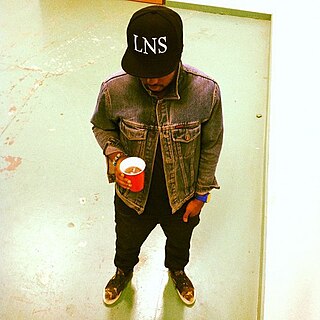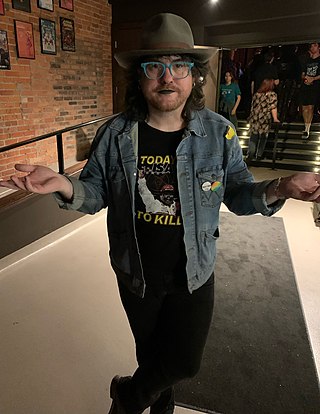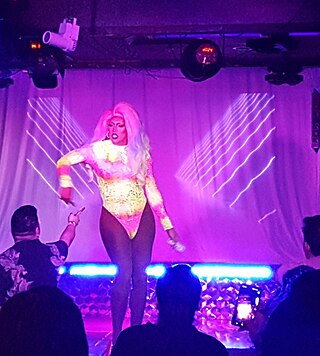
Austin City Limits (ACL) Music Festival is an annual music festival that takes place in Zilker Park in Austin, Texas, on two consecutive three-day weekends and is inspired by the KLRU/PBS music series Austin City Limits. The festival is produced by Austin-based company C3 Presents, which also produces Chicago’s Lollapalooza.

Leah Lakshmi Piepzna-Samarasinha is a Canadian-American poet, writer, educator and social activist. Their writing and performance art focuses on documenting the stories of queer and trans people of color, abuse survivors, mixed-race people and diasporic South Asians and Sri Lankans. A central concern of their work is the interconnection of systems of colonialism, abuse and violence. They are also a writer and organizer within the disability justice movement.
Lesbian, gay, bisexual, transgender, and queer+(LGBTQ+)music is music that focuses on the experiences of gender and sexual minorities as a product of the broad gay liberation movement.

Randell Obrain Jones, known professionally as Kydd, is an American rapper, producer, and singer from Austin, Texas.

LGBTQ culture in Portland, Oregon is an important part of Pacific Northwest culture.
Ben Ballinger is an American folk singer-songwriter based in Austin, Texas. He is best known for his solo career and was recognized by The Austin Chronicle as one of "Austin's top young songwriters".

Alok Vaid-Menon is an American writer, performance artist, and media personality. Vaid-Menon is gender non-conforming and transfeminine, and uses the singular they third person pronouns.

The ongoing COVID-19 pandemic has highlighted inequities experienced by marginalized populations, and has had a significant impact on the LGBT community. Pride events were cancelled or postponed worldwide. More than 220 gay pride celebrations around the world were canceled or postponed in 2020, and in response a Global Pride event was hosted online. LGBTQ+ people also tend to be more likely to have pre-existing health conditions, such as asthma, HIV/AIDS, cancer, or obesity, that would worsen their chances of survival if they became infected with COVID-19. They are also more likely to smoke.
Dorian Delafuente, known by his stage name BabiBoi, is an American rapper.
Peter Knegt is a Canadian writer, producer, and filmmaker. He is the recipient of five Canadian Screen Awards and his CBC Arts column Queeries received the 2019 Digital Publishing Award for best digital column in Canada.

Kade Gottlieb, better known as Gottmik, is an American drag performer and make-up artist. Gottmik was the first trans man to compete on RuPaul's Drag Race, coming in shared 3rd/4th place on the thirteenth season with fellow contestant Rosé. Gottmik later returned to compete in the ninth season of RuPaul's Drag Race All Stars. Gottmik co-hosts the podcast No Gorge alongside Violet Chachki.
Sloan Christian Struble, is an American singer, songwriter, and producer from Aledo, Texas. He is best known as the founder and frontman of the indie pop project Dayglow. Dayglow released its debut album, Fuzzybrain, on September 28, 2018. Dayglow performing members include bassist Peyton Harrington, drummer Brady Knippa, keyboardist Norrie Swofford, guitarist Colin Crawford, and in the past have included guitarist Nate Davis, drummer Reece Myers, keyboardist Nico Fennell, bassist Eric Loop, and saxophonist Marshall Lowry.
Kama La Mackerel is a Mauritian-Canadian multidisciplinary artist, activist, translator, and community organizer who resides in Montreal, Quebec. Their artistic practice moves between theatre, dance, spoken word and written poetry, watercolours, photography, performance, sculpture and installation. Working across multiple disciplines, La Mackerel's work explores their identity as a trans femme of colour who reaches back beyond the immediate constraints of the colonial circumstances of their life to the spiritual ancestral lineages of queer femmes.

Allison Ponthier is an American indie folk singer-songwriter. Her debut EP Faking My Own Death was released in 2021, and her second EP Shaking Hands With Elvis was released in 2022.

Adeem the Artist, sometimes known as Adeem Maria or Adeem Bingham, is an American country music singer. They have released eight albums and a number of singles.

Flawless Shade is the stage name of Tajh Jordan, an American drag performer and make-up artist based in Portland, Oregon. A former Miss Gay Oregon, Flawless Shade has been featured in campaigns by Adidas, GLAAD, and Top Level Design.
Brigitte Bandit is the stage name of Cheri Lake, an American drag queen and activist based in Austin, Texas.

Violetta J'Adore is a Greek Cypriot drag queen and model based in London, United Kingdom. She has represented the UK and Greece in the Queen of the North Continental, a European preliminary of the Miss Continental.











